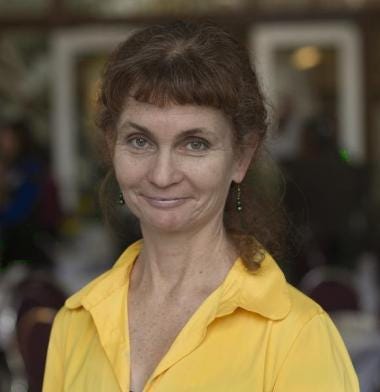A Visit to Maryhouse
Claire Schaeffer-Duffy, a member of the Worcester Catholic Worker, meditates on spending a night in Dorothy Day's old room.
Editor’s Note: This article originally appeared in the April/May Issue of The Catholic Radical. You can read the full issue here.
In March, I traveled to New York City to participate in Nuclear Ban Week, a five-day event paralleling the Third Meeting of States Parties to the Treaty on the Prohibition of Nuclear Weapons (TPNW) held at the United Nations. I stayed at Maryhouse Catholic Worker. For four nights, I slept in the room where Dorothy Day lived during her later years. The room where she also died. Its two long walls are lined with books Dorothy read. There’s a desk, appropriately cluttered with stacks of folders and aging magazines, an armchair, a comfortable rocker, and two chests of drawers.
Only the bed is not original, I was told. On the nightstand sits a dial radio as old as myself, if not older. You must rotate the knob through some static to locate the friendly voice of the broadcaster for New York’s public radio station. Hearing the morning news pour out from that old machine, one that kept functioning through hard times, as well as good, felt oddly reassuring. Two windows face Third Street. Because the ancient radiator runs too hot, one window stays cracked open during the cold months to let in cool air. Each night, I fell asleep to the chatter and laughter on the street below. In the morning, I woke to the wheezing brakes of delivery trucks and the shouts of their drivers trying to navigate the cluttered thoroughfare.
I had three confirmed commitments in New York: attending the International Campaign to Abolish Nuclear Weapons Forum at Riverside Church, which was the opening event for Nuclear Ban Week; participating in Archbishop John Wester’s Shrove Tuesday Mass for the Abolition of Nuclear Weapons, and joining my fellow Catholic Workers for an Ash Wednesday protest at the US Mission to urge our callous government to support the TPNW.
During the unclaimed hours, I imagined making a mini-retreat in Dorothy’s room. I would read her books, write in my journal, pray to her for inspiration, and from the window watch New Yorkers carry on with daily life while the country fell apart. But the lure of the City pulls on the curious. Instead of long morning prayers, I walked or caught the bus uptown to the Church Center of the United Nations. In a conference room on the eighth floor, I listened to speakers from frontline nuclear-affected communities, most of them women, detail how the production, storage, and testing of nuclear weapons wreak havoc on humans and their habitats. “As a child, I thought where I lived was beautiful,” said a Dine (Navajo) woman from the American southwest. But after a uranium leak from a storage site contaminated local land and water and left her family with cancers, her childhood paradise felt untrustworthy, she said. It had become a place of invisible hazards.
The audience, many of whom came from nuclear-affected communities, resonated with the women’s stories. Some listeners wiped away tears. Others offered encouragement whenever a speaker faltered while describing generational cancers or ecological devastation. The courage and compassion I observed in that conference room was a shot of hope for me. Tenderness still thrives.
For two months now, I have stayed enraged over the grotesque cruelty of our current administration. Rage of this nature affects one’s vision. When the priest speaks of the “resurrection hidden within the crucifixion,” I look at him blankly. New York brought relief. My days there took on a holy rhythm in spite of my frenzied self. Morning prayer in Dorothy’s room, a bit of news from the old radio, coffee.
On my trek downstairs for that first cup, I would pass the tabernacle candle twinkling in the dark chapel, and women at the front door waiting for 8 a.m. breakfast. The Catholic Workers say Evening Prayer in the dining room at the folded table near the kitchen door. They drone through the Psalms, but their prayers of intention are earnest and long. Ω
Claire Schaeffer-Duffy lives and works at the Sts. Francis and Thérèse Catholic Worker in Worcester, Massachusetts. Claire is a convert to Catholicism and is highly influenced by Catholic social teaching’s tendency to question the status quo, particularly in relation to suffering. Her work is driven by the coupling of a strong faith grounded in seeing Christ and the value in all humans combined with an active resistance to structural inequalities through demonstrations and other forms of disobedience aimed at sending a political message. Her articles and reviews have appeared in America, Commonweal, US Catholic, the collection Nonviolence as a Way of Life: History, Theory, and Practice and Opposition to War: An Encyclopedia for US Peace and Anti-war Movements. Her profiles and investigative reporting have merited Catholic Press Awards. Claire and her husband Scott have four children and three grandchildren.






